The untold stories
By Sheher Bano
Shahzada Irfan
Zaib Azkaar Hussain
Mir Khalil-ur-Rahman, who is rightly called the father of Urdu Journalism, possessed a multifaceted personality. Many writers, scholars and people of opinion have written articles and columns on his life and work, but still there are many aspects of Mir Saheb’s life which hitherto are not very well-known to people. With his sheer professionalism and poised personality, he played a historic role in the field of journalism and rendered commendable services for the freedom of the Press in Pakistan. Many people who are still working in Jang group and had the honour to work with Mir Saheb have countless anecdotes to share, which show a glimpse of his personality as Mir Khalil-ur-Rahman and as a thorough professional who was called the “Father of Journalism.” One of the members of senior management while sharing an incident, narrated:
“After Mir Saheb’s death, the All Pakistan Newspaper Society (APNS) held a reference in his memory. In the absence of his sons, who were making arrangements to bring his body to Pakistan from London, I represented the Jang Group at that reference. Various people, who gathered there, shed light on his personality. However, an owner of a renowned newspaper, whose name I will not reveal due to secrecy, stood up and narrated his personal account. According to him:
“Generally, Mir Saheb was considered a shrewd businessman and not at all a spend-thrift to blindly spend money. Rather, he was known to be frugal and prudent in terms of spending money. Moreover, it was also said that he never let any newspaper to outperform Jang. I want to share an incident that was classified between me and Mir Saheb. I think it is the right time and place to disclose it. Few years ago, my newspaper was not doing well and I was about to close it down. I had not paid salaries to my staff for three months and was totally out of money to continue it further. With heavy heart, I decided to shut down my paper. I was very heartbroken and despondent at that time. One day, when my staff left for afternoon prayers, I heard someone approaching my office through back wooden stairs. It was Mir Saheb. I thought that vultures were circling that they knew I was a dying man. I thought Mir Saheb came to buy my newspaper at throw-away price. But what I experienced in the next few minutes was simply startling and entirely contrary to my shattered thoughts. Mir Saheb, in his polite voice said: ‘I heard that you are under severe financial crunch and planning to shut down your newspaper. Being a publisher myself, I know how dear a newspaper is to its publisher. I can feel the pain you must be going through while taking this hard decision.’ While saying this, he handed me a brown envelop and said: ‘Look, I know we are competitors but I don’t want your newspaper to close down. Here is enough money to pay salary to your staff and to resume publishing of your newspaper. I came at this hour because I knew none will be here. At the back street, I have brought a truckload of newsprint, accept it but do not shut down the newspaper. Our competitive relationship aside, I will not let your paper die.”
Bewildered and awe-struck, I was simply speechless on this generosity. Today, I owe the success of my newspaper to Mir Saheb who held my hand at a time when I was utterly demoralised and broken. Though I paid back that amount to Mir Saheb later when things got better, but today I owe the existence of my newspaper to him only. Mir Saheb’s evening newspaper was a very hard competitor of our newspaper, but he had compassion for newspapers, journalists and publishers. His kind attitude and generosity towards me at such a crucial time was simply unbelievable and belies all the propaganda about his frugal nature. He was a great man indeed.” It was just one of the few personal accounts of Mir Saheb’s kind-heartedness that all the publishers gathered around the narrator of this anecdote.
In this section we are giving the views of some politicians, scholars, educationalists and people of opinion, who share their fond memories about Mir Saheb:
Lt Gen (retd) Moeenuddin Haider
Former Governor, Sindh

I have fond memories of my meetings with this man of great principles who had immense love for his country. Also, MKR had a good eye for talent and always promoted it.
We met quite frequently when I was a brigadier and doing a course in London. I would like to share an interesting experience with you: It was in 1984 when I met him at a function hosted by Pakistan’s High Commission in UK to mark Pakistan’s Independence Day. The High Commission had organised the event on August 12 instead of August 14. The reason they cited was that the hall was not available on August 14 so they decided to hold the event two days earlier.
When Mir Saheb came to know about this, he expressed his reservations against the decision and even mentioned it in the address to the participants that such important days have to be celebrated on actual dates. He said that if a particular hall was not available on a particular day, the Pakistani community in London should have gone for an alternative arrangement, whatever the cost be. This showed how patriotic he was.
Moreover, he was a very humble man. Whenever I would introduce him to people as the founder of Pakistan’s biggest empire he would forbid me to do so. I would say I am simply narrating a fact and nothing else.
Ghulam Dastgir Khan
PML-N, Former Federal Minister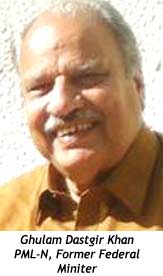
MIir Saheb was truthful, humane, pleasant and always down-to-earth. He believed in hard work and practically proved that one can achieve anything if they remain committed, focused and motivated.
When I was a federal minister, I stayed at his house whenever I went to Karachi. There, I would see him working late at night. I wondered whether he ever took rest. He was always so concerned and ensured that every newsworthy item was published and not dropped.
I remember the day he came to receive me at the airport. It was an extremely hot day. I could not find him inside the VIP lounge but when I came outside I saw him standing in a corner perspiring from head to toe. I asked him as to why he did not come inside. His answer was that his VIP pass had expired so he felt it was not ethical to go inside without it. You can well imagine how principled he was. Nobody would have stopped him from going inside the VIP lounge yet he stayed back.
Furthermore, MKR was a pious man and used to pray five times a day. Also, he selected religious names for his children. He had lived in Gujranwala for long and had great love for this city. He constructed a six-canal house there and named it “Five Sisters House” after his five daughters. Nobody lives there at the moment but it is a symbol of the bond the family has with his city. His wife, who I call Maan Jee, visits Gujranwala occasionally and graces me and my family with her presence whenever she is there.
Meraj Muhammad Khan Veteran politician and trade unionist
 I know Mir Khalil-ur-Rahman as a man of determination who would stay put amid difficulties of all sorts. He faced state censorship of the worst type and suffered due to suspension of government ads but still managed to save his newspaper from closure. He was able to do so only due to his cool-headedness and unique statesmanship qualities. I know Mir Khalil-ur-Rahman as a man of determination who would stay put amid difficulties of all sorts. He faced state censorship of the worst type and suffered due to suspension of government ads but still managed to save his newspaper from closure. He was able to do so only due to his cool-headedness and unique statesmanship qualities.
He knew me as a trade unionist and later on as a politician. I remember we would simply walk in his office to lodge protest whenever we thought our news was not covered properly. At times, our tone was harsh but he would keep smiling, talking to us in a pleasant mood and taking notes. Often, he honoured our request and asked us where we wanted to get the news published. We would often find the news flashed on that particular page the next day.
I would also like to mention here that he was a peace loving man and always wanted to avoid confrontation. He was a supporter of peaceful relations between Pakistan and India. The ongoing Aman ki Asha campaign, I think, is the continuation of this desire of his. I am sure his successors who are running this campaign got inspiration from him.
In 1961, I along with my other fellow trade unionists were punished and exiled from our city. He carried our pictures as well as our statements in his newspaper. However, he softened the tone a bit. Those who have lived and seen those times very well know how difficult and risky it was to give news coverage to those raising voices against dictatorship. However, he was brave enough to do that.
Shaikh Rashid Ahmed
President, Awami Muslim League
During my student days, it was my routine to dine at Jang office canteen in Rawalpindi, and would stay there till the paper was sent to the press. An aura of professionalism with complete silence meant that Mir Saheb was present in the office.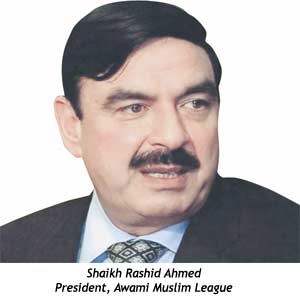 I would sit in the office of either Shorish Malik or Hafiz Ashrafi and there I had the honour of meeting Mir Saheb many times. Wearing simple clothes, he always met us lovingly with a beaming face without any pretentiousness or pride in his mannerism. Sometimes, he would even dine with us in steel plates sent by the Jang canteen. I would sit in the office of either Shorish Malik or Hafiz Ashrafi and there I had the honour of meeting Mir Saheb many times. Wearing simple clothes, he always met us lovingly with a beaming face without any pretentiousness or pride in his mannerism. Sometimes, he would even dine with us in steel plates sent by the Jang canteen.
I still remember that it was my routine to place an advertisement worth Rs 50 in Jang, carrying a 30-day programme of Iftar dinners at old Lal Haveli. Once, however, that ad could not be printed. When I made a complaint to Mir Saheb, he bitterly admonished his staff. So was his commitment to his work.
I knew Mir Saheb since my childhood days and even at that he predicted that “Someday this boy will be a famous man, a minster for sure.” Such was his judgment about people. I also had the privilege of going inside Roza-i-Rasool (SAW) with Mir Saheb, while I was travelling along with him to Saudi Arabia. Many a time, during my stint as a minster, he came to Lal Haveli and we sat at the rooftop on charpoy and talked endlessly in a casual manner.
He had great apprehensions when Jang, Lahore, was about to be launched. He would say, “I am afraid Shakil (Mir Shakil-ur-Rahman) would ditch me. Out of his (Mir Shakil’s) incredible creativity, he always takes up tasks bigger than his stature.” And I would console him by saying: “Let them do as they wish because ultimately, you have to leave behind all this for them only.”
Moreover, without being an educationist by profession, he was a great teacher. One important thing which I learnt from him was that just before checking in at any five-star hotel, he would always buy packets of juice, bottled water, etc. Once, upon asking him the reason for doing so as everything was available in the hotel, he gave me a strange philosophy: “One should spend money and not waste it.” He was indeed quite cautious when it came to spending money.
On another occasion, a five-star hotel sent him a bill, with dry-cleaning charges of a suit, mistakenly added to it. He called up the manager and expressed his anger on sending an inflated bill with wrong entries. The manager immediately corrected it and made an apology. Mir Saheb always took some time to have a look at the bill with his black spectacles on before signing it. He would advise, “One should never sign the bill without reading it.” It was again a great learning for me.
I can claim with real pride that I was the only young man with whom he used to share light moments and would laugh.
Mir Saheb was outspoken and a daring person. He never hesitated whenever he wanted to assert his point. Once, when I was serving as a minster during Prime Minister Nawaz Sharif’s government, Mir Saheb told Nawaz Sharif very bravely, “All politicians are the same. All the ills in their personality usually creep through their advisors.” Sometimes, I used to be critical of him for having friendship with junior staff in the information ministry. On my polite complain on this he would say smilingly: “The ministers keep rotating but these people remain posted here”.
Like a thorough professional, he used to scan the whole newspaper while reading even the smallest news items and would write notes on the side of the column. Mir Saheb used to sleep for a very few hours. Often I would ask him: “Mir Saheb when do you sleep?” I had learnt that all the great personalities slept very less and Mir Saheb was the real embodiment of a great personality.
Mir Saheb had great respect for people who excelled in any field and he always acknowledged their worth open-heartedly. Once, Jang printed a picture of a well-known scholar and writer, Agha Shorish Kashmiri in its Sunday edition with a caption “Editor of a weekly magazine”. At that time, Jang used to print a big picture of a famous personality in the centre of the page in its Sunday edition. Coincidently, he met Shorish Kashmiri in a five-star hotel, who sarcastically quipped: “Mir Saheb, I am just the editor of a weekly magazine”. Mir Saheb sensed the sarcasm hidden in his comment. The very next Sunday, he printed his picture again, with a detailed caption with all his credentials and personality traits.
I A Rahman, Director
Human Rights Commission of Pakistan
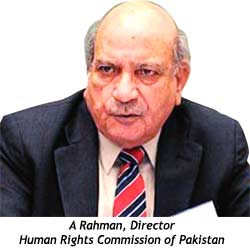 I had a few interactions with MKR and found him a thorough gentleman and a true professional who had risen in life through sheer hard work. He remained committed to his profession; started as a journalist from Delhi, settled down in Karachi after Partition and one day established one of the leading newspapers of the country (Pakistan). I had a few interactions with MKR and found him a thorough gentleman and a true professional who had risen in life through sheer hard work. He remained committed to his profession; started as a journalist from Delhi, settled down in Karachi after Partition and one day established one of the leading newspapers of the country (Pakistan).
Besides having a great sense of news, he also had a pleasant personality. I remember once we had set up a camp in support of workers outside his office. The camp stayed there for a couple of days. He would come twice in the day to visit us and ask if everything was fine with us. It was a good gesture on his part. Though the contentious issues were yet to be resolved, the campers felt he cared for them.
I also got a chance to travel with him, during which I found him to be very accommodating and caring towards his companions.
Jamiluddin A’ali
poet, scholar, educationist,
critic, researcher, columnist, and former senator
Mir Khalil-ur-Rahman was a great patron of Urdu and English journalism in Pakistan as well as abroad. It was solely due to his untiring efforts and unwavering commitment that Jang Group became the largest and the most prestigious media house in 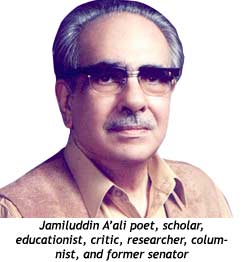 Pakistan. Pakistan.
Mir Saheb had launched his newspaper ‘Jang’ at a time when the World War II was at its peak and people of the subcontinent wanted to stay updated about the ongoing war. MKR launched Jang from Delhi and his hard work and devotion can be gauged from the fact that he not only supervised his team regarding printing of the paper but also participated in all the production tasks himself alongside his staff. From proofreading to editing to pasting, Mir Saheb helped his colleagues with everything. He even didn’t hesitate from distributing the newspaper on his bicycle to different parts of the city, including some colleges.
At that time of launch of Jang from Delhi, I was studying at a local college there. Once I made arrangements for a delegation to visit abroad and in this way MKR and I got a chance to travel together. During that trip, the ties between Mir Saheb and I considerably strengthened and then converted into a deep friendship. At times, MKR consulted me on different issues regarding Jang.
Sahar Ansari
poet, educationist, journalist and critic
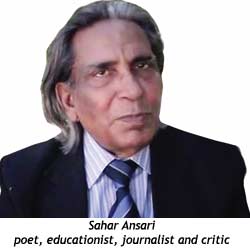 I used to frequent Jang office (located near Burns Road¸ Karachi, at that time) to meet Shafi Aqeel, Athar Nafees, and Sultana Mehar et al. I always found Mir Saheb very kind and encouraging towards visiting writers. I used to frequent Jang office (located near Burns Road¸ Karachi, at that time) to meet Shafi Aqeel, Athar Nafees, and Sultana Mehar et al. I always found Mir Saheb very kind and encouraging towards visiting writers.
When Mir Saheb decided to set up Jang office in London, six of his staff members, who were entrusted with this task, were having difficulties in the issuance of visas. Mir Saheb was quite upset as the project was getting delayed. When I learnt about this, I personally requested the local diplomats deputed at the UK embassy in Pakistan to arrange visas for these six staffers of Jang so that they could go to London and set up Jang office there. Those diplomats gladly obliged us and issued visas. Mir Saheb always remembered this little favour on my part and was extremely kind towards me. At that time, I was affiliated with the Education Department as a lecturer and later on as a professor. He gave me the options to either join Jang as a regular employee or keep writing for the newspaper as a freelance journalist. This way, he opened a new vista of journalistic writings for me.
Mir Saheb was a God-fearing person. One can judge the kindness of Mir Saheb from the fact that he never sacked a single person from Jang.
S M Fazal, Editor of Daily News
I believe that one of the secrets of Mir Saheb’s phenomenal success, as a journalist and as the owner of the largest newspaper empire in the country, was his excellent time management and self discipline. Working under him for many years, I used to marvel at him for keeping himself aware of the working of every department of his vast organisation and at the same time, staying abreast of the latest news. Journalism was his first love and he had the zest of a young reporter to be first with the news. Unlike other proprietors and editors, he would personally attend the important briefings and press conferences where he would be seen assiduously taking notes. 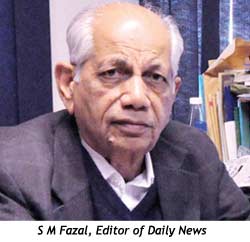
Mir Saheb would never miss the main newscast of Radio Pakistan, the BBC and the All India Radio, and would often give us breaking news. I remember when Sheikh Mujibur Rahman was assassinated and his government was overthrown, we had sent the paper’s copy to the press during the early hours of the morning when all the staff had left the office. I was sitting alone in the office, doing some writing, when he called me up and informed me about the disturbance taking place in Dhaka. I went to check on the APP teleprinter but there was no such news. Just as I went back to my seat, the telephone rang and Mir Saheb was on the line. He asked me: ‘Have you heard the news?’ I said, ‘only partly’. He then dictated to me the story of the coup that he had monitored from two foreign radios, including the All India Radio. As a result of this timely information, the Daily News became the first newspaper in Pakistan to publish a supplement about the coup in Bangladesh.
Mir Saheb often used to go abroad with the president/ prime minister and would file stories for his papers from there. He would never forget the Daily News deadlines and would, sometimes, dictate the stories to us over the phone.
He was a stickler about news. The Daily News was just one of the many publications of the Jang group, but Mir Saheb would go through not only the Daily News every afternoon but he would also read the two other English eveningers published in the city. He would thoroughly scrutinise those papers, and if he ever found out that we had missed any important story, he would become really furious.
As an editor who had worked with him for several years, I can say that he gave complete freedom to his editors. As a matter of fact, he hated being consulted about any news item and always appreciated us to take our own decisions and be prepared to be accountable for that.
Mir Saheb firmly believed that a newspaper must operate on the basis of news. Once, I prepared a scheme to introduce a crossword puzzle with prize money in the Daily News and took it to Mir Saheb for his approval. However, to my disappointment, his mood turned sour and he returned the file to me saying: ‘mian kia akhbar ko muimmon say chalao gay? Akhbar khabron say chalta hai.” (Will you run the newspaper through crossword puzzles? A newspaper is run by news only).
Tishna Barelvi, poet, journalist and critic
I had the honour of working with MKR in the 60s. To me, Mir Saheb’s personality was like that of the Quaid-i-Azam because of his style and caliber. He was blessed with a very good decision-making power. It is solely because of his strong personal appeal and unfaltering composure that made Jang Group a great success. He was a true representative of not only his paper but was also a patron of journalism in Pakistan.
During the early days of Jang, Mir Saheb, despite being the owner of the paper, worked like a professional journalist. From reporting to editing to production work, he excelled in everything. He also acquired training in showbiz journalism.
Mir Saheb was very lenient towards his hard working employees and always supported and backed them up. He advised them not to sit idle as he (MKR) himself had never wasted his time. He would, instead, spend hours and hours in office and would come up with innovative ideas that made Jang Group a very successful and modern organisation.
Zebun Nisa Zebi
poetess, critic and educationist
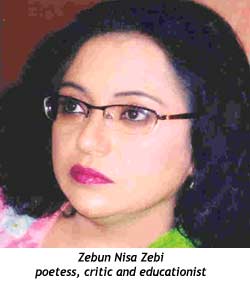 In the late ‘70s, I used to visit Jang office in order to drop my articles. Mir Saheb always encouraged me to contribute more articles for his paper. It was due to the encouragement of MKR that I continued writing for Jang and it was solely because of his support that I started writing short stories and tried my hands on poetry too. Mir Saheb was a great human being and a creative journalist. It is seriously hard to find devoted people like him these days.” In the late ‘70s, I used to visit Jang office in order to drop my articles. Mir Saheb always encouraged me to contribute more articles for his paper. It was due to the encouragement of MKR that I continued writing for Jang and it was solely because of his support that I started writing short stories and tried my hands on poetry too. Mir Saheb was a great human being and a creative journalist. It is seriously hard to find devoted people like him these days.”
|
|

